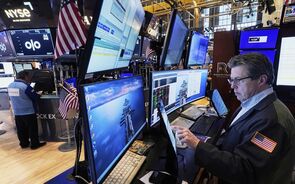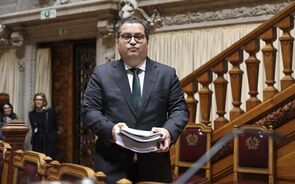Economia Alemã
1 Mensagem
|Página 1 de 1
Economia Alemã
(Bloomberg) -- Germany's economy, Europe's largest, barely grew for a third quarter and the central bank said there's little sign of improvement.
Gross domestic product expanded 0.3 percent in the third quarter from the previous three-month period, the same rate as in the preceding two quarters, the Bundesbank said.
Germany accounts for about a third of the economy of the dozen nations sharing the euro. Deutsche Telekom AG last week reported Europe's biggest quarterly loss. Stagnant growth is eroding government revenue, spurring Chancellor Gerhard Schroeder to increase taxes and cut spending.
``Next year won't be any better than this one,'' said Ingo Koch, chief financial officer of MAN Roland Druckmaschinen AG, the world's second-largest maker of printing presses, whose customers include Gannett Co. Inc., the publisher of USA Today. ``We're scaling back our production capacities.''
Business confidence dropped for a fifth straight month and unemployment rose to the highest in almost four years in October. The economy will grow 0.2 percent this year and 1 percent next, a panel of advisers to the government known as the ``Five Wise Men'' said in their annual assessment of the economy.
``What's missing the most is the hope for an improvement, which has always been a prerequisite for stronger investments and employment,'' the bank said in its November report.
German growth in the third quarter was led mainly by exports and consumer spending, the central bank said. At the same time, waning pessimism among shoppers means that consumer spending will be ``moderate,'' the bank added.
`Reluctant to Spend'
``Consumers are still reluctant to spend,'' said Wolfgang Urban, chief executive officer of KarstadtQuelle AG. Germany's biggest department-store operator said today 2002 earnings will drop by more than a third , hurt by slumping demand.
Stagnating growth is putting pressure on the European Central Bank to lower interest rates. The European Commission last week pared its growth forecast as demand slows, stock markets decline and executives become more pessimistic.
``The weakening outlook for growth this year and next leads us to expect that inflation rates will come down, and the ECB council will have to take that into consideration,'' Ernst Welteke, an ECB policy maker who also heads the Bundesbank, told reporters last week.
Futures trading suggests the bank will reduce its benchmark rate from 3.25 percent as soon as next month. The implied yield on the three-month Euribor contract maturing in December is 2.94 percent. The yield on the March contract is 2.83 percent.
Hurting Neighbors
Germany is crimping growth among neighboring countries. The Bank of France predicts gross domestic product in the euro region's No. 2 economy expanded just 0.4 percent in the three months through September, and will increase at the same rate in the final quarter. Italy's third-quarter GDP expanded 0.3 percent from the second, when it rose 0.2 percent. The Netherlands grew just 0.1 percent from July through September.
The U.S. economy expanded at a 3.1 percent annual rate in the third quarter. Growth will probably slow to 1.6 percent in the fourth quarter, a Blue Chip Economic Indicators survey on Nov. 10 showed.
German economic growth may grind to a halt at the end of the year and a quick recovery next year is not in sight because of ``higher taxes and costs and rising unemployment,'' the German banking association BDB said in a report published today.
The government plans to boost revenue by raising 66.7 billion euros ($67.3 billion) in four years by increasing social insurance contributions and eliminating tax breaks.
``The deterioration in the labor market intensified in the third quarter'' in Germany, France, Italy and Spain, said Silvia Pepino, an economist at J.P. Morgan Chase & Co. in London. The ECB ``is moving closer to a policy easing.''
The Federal Statistics Office will publish official figures on Thursday morning.
Gross domestic product expanded 0.3 percent in the third quarter from the previous three-month period, the same rate as in the preceding two quarters, the Bundesbank said.
Germany accounts for about a third of the economy of the dozen nations sharing the euro. Deutsche Telekom AG last week reported Europe's biggest quarterly loss. Stagnant growth is eroding government revenue, spurring Chancellor Gerhard Schroeder to increase taxes and cut spending.
``Next year won't be any better than this one,'' said Ingo Koch, chief financial officer of MAN Roland Druckmaschinen AG, the world's second-largest maker of printing presses, whose customers include Gannett Co. Inc., the publisher of USA Today. ``We're scaling back our production capacities.''
Business confidence dropped for a fifth straight month and unemployment rose to the highest in almost four years in October. The economy will grow 0.2 percent this year and 1 percent next, a panel of advisers to the government known as the ``Five Wise Men'' said in their annual assessment of the economy.
``What's missing the most is the hope for an improvement, which has always been a prerequisite for stronger investments and employment,'' the bank said in its November report.
German growth in the third quarter was led mainly by exports and consumer spending, the central bank said. At the same time, waning pessimism among shoppers means that consumer spending will be ``moderate,'' the bank added.
`Reluctant to Spend'
``Consumers are still reluctant to spend,'' said Wolfgang Urban, chief executive officer of KarstadtQuelle AG. Germany's biggest department-store operator said today 2002 earnings will drop by more than a third , hurt by slumping demand.
Stagnating growth is putting pressure on the European Central Bank to lower interest rates. The European Commission last week pared its growth forecast as demand slows, stock markets decline and executives become more pessimistic.
``The weakening outlook for growth this year and next leads us to expect that inflation rates will come down, and the ECB council will have to take that into consideration,'' Ernst Welteke, an ECB policy maker who also heads the Bundesbank, told reporters last week.
Futures trading suggests the bank will reduce its benchmark rate from 3.25 percent as soon as next month. The implied yield on the three-month Euribor contract maturing in December is 2.94 percent. The yield on the March contract is 2.83 percent.
Hurting Neighbors
Germany is crimping growth among neighboring countries. The Bank of France predicts gross domestic product in the euro region's No. 2 economy expanded just 0.4 percent in the three months through September, and will increase at the same rate in the final quarter. Italy's third-quarter GDP expanded 0.3 percent from the second, when it rose 0.2 percent. The Netherlands grew just 0.1 percent from July through September.
The U.S. economy expanded at a 3.1 percent annual rate in the third quarter. Growth will probably slow to 1.6 percent in the fourth quarter, a Blue Chip Economic Indicators survey on Nov. 10 showed.
German economic growth may grind to a halt at the end of the year and a quick recovery next year is not in sight because of ``higher taxes and costs and rising unemployment,'' the German banking association BDB said in a report published today.
The government plans to boost revenue by raising 66.7 billion euros ($67.3 billion) in four years by increasing social insurance contributions and eliminating tax breaks.
``The deterioration in the labor market intensified in the third quarter'' in Germany, France, Italy and Spain, said Silvia Pepino, an economist at J.P. Morgan Chase & Co. in London. The ECB ``is moving closer to a policy easing.''
The Federal Statistics Office will publish official figures on Thursday morning.
Quanto mais sei, mais sei que nada sei
- Mensagens: 29
- Registado: 5/11/2002 10:51
1 Mensagem
|Página 1 de 1


